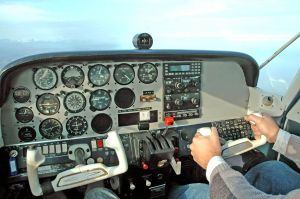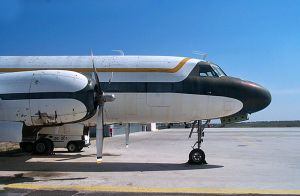Travel Tips
Regional Airlines Agree to Improve Procedures and Standards after Air Safety Summit
 After a one-day meeting Monday involving more than 50 airline officials, government representatives and union members, the FAA and regional airlines have agreed to implement a series of voluntary measures aimed at improving safety and bringing smaller carriers more in line with larger national airlines.
After a one-day meeting Monday involving more than 50 airline officials, government representatives and union members, the FAA and regional airlines have agreed to implement a series of voluntary measures aimed at improving safety and bringing smaller carriers more in line with larger national airlines.
The meeting came in the wake of last month’s hearings into the February crash of Continental Connection Flight 3407 in Buffalo, which revealed a number of alarming practices that likely led to the accident.
Pilot fatigue, lack of training, incomplete screening, and unprofessional cockpit practices were cited during the May hearing as contributing to the crash, which killed 50 people.
Among the measures agreed upon at Monday’s meeting were new regulations regarding how many hours pilots can work; more detailed examination of pilots’ flying records; implementation of mentoring programs; more involvement by major carriers in training pilots at the regional level; and better monitoring of data from flights.
 Though major carriers generally exceed FAA rules with regard to safety and training, regional airlines often operate at the bare minimum level of compliance. Pilots often have less experience, lower salaries and less training than their counterparts at larger airlines, and equipment is inspected less frequently.
Though major carriers generally exceed FAA rules with regard to safety and training, regional airlines often operate at the bare minimum level of compliance. Pilots often have less experience, lower salaries and less training than their counterparts at larger airlines, and equipment is inspected less frequently.
Even though laws exist in some of these areas, some feel that existing loopholes, especially in the area of background checks, make these laws less effective than they could be.
For example, in 1995, after a crash involving a pilot who had recently been fired for incompetence by another airline, a law was passed to allow prospective employers to get detailed work history about applicants from prior employers.
However, this law only allowed employers to request details of a pilot’s tenure at a job and a few other details, but not necessarily test results. The regulations agreed to on Monday will go further and require job applicants to waive their right to privacy which will allow airlines to ask the FAA for test results.
Captain Marvin Renslow failed to reveal to Colgan Air, the operator of Flight 3407, that he had failed three in-cockpit exams prior to his employment. He had also not received training in the stick-push technique which could have prevented the crash. Neither the captain nor his co-pilot, Rebecca Shaw, lived near the airline’s hub in Newark, New Jersey.
 Some representatives of regional airlines defend their current practices and argue that they are just as safe as the major carriers. But in light of the Buffalo crash and negative public perceptions that resulted, they have opted to take voluntary measures to address some of the concerns raised by the FAA.
Some representatives of regional airlines defend their current practices and argue that they are just as safe as the major carriers. But in light of the Buffalo crash and negative public perceptions that resulted, they have opted to take voluntary measures to address some of the concerns raised by the FAA.
On Friday, the president of the Regional Airline Association announced a plan to study pilot fatigue, conduct random tests to ensure pilots are alert, perform more extensive background checks, and other measures that will reduce cockpit errors.
Current statistics on U.S. air crashes contradict the regional carriers’ claims of safety. All six of the fatal passenger airline crashes in the U.S. after September 11, 2001, have involved regional carriers. In addition, in eight of the last nine regional airline accidents in the U.S., at least one pilot had failed multiple flight tests.
Some critics are skeptical that any new voluntary rules will be adopted anytime soon. Traditionally, airlines and the FAA reach agreement on rule changes by consensus, and it can take years for new procedures to be implemented.
 But one pilot at a regional carrier said that unless the rules become law in this case, many smaller airlines will simply operate as usual because it is too costly for them to make changes.
But one pilot at a regional carrier said that unless the rules become law in this case, many smaller airlines will simply operate as usual because it is too costly for them to make changes.
Scheduling pilots to work fewer hours would involve hiring more personnel, and increasing training and raising salaries above current levels would involve an outlay of cash that few airlines have in the current economy. Though many people think that pilots are well-paid, during the May hearings it was revealed that co-pilot Rebecca Shaw made only about $24,000 a year.
The FAA has pledged to take a tough stance against enforcement. New FAA chief Randy Babbitt made it clear that the Monday meeting was convened before the final report into Flight 3407 was complete, because he wanted emergency action taken on what he considered serious problems.
Regional airlines, which mostly operate under contract to major carriers, fly 50 percent of all flights in the U.S. and carry about 20 percent of all passengers. Approximately 60,000 people work at regional airlines around the country.
By Karen Elowitt for PeterGreenberg.com.
Related links: USA Today, Associated Press, New York Times, ABC News, NPR, CNN
Related links on PeterGreenberg.com:
- Buffalo Crash Probe Raises Training, Safety Questions About Regional Flights
- The Crash of Flight 3407: Interview With Former NTSB Investigator Greg Feith
- Ice, Autopilot Examined as Causes of Fatal Buffalo Crash
- The Crash of Flight 3407: Airline Pilots Weigh In
- Continental Plane Crash Kills 50 Near Buffalo, New York












